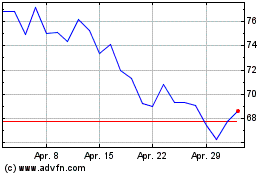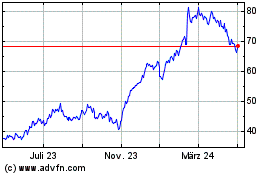Uber, DoorDash Gig Worker Victory in California Sets Tone for Other Fights
05 November 2020 - 1:25AM
Dow Jones News
By Preetika Rana
Gig-economy companies including Uber Technologies Inc. and
DoorDash Inc. won passage of a California ballot measure protecting
their contract-worker systems, a major victory the companies hope
will help them beat back challenges to their business models
elsewhere in the U.S. and beyond.
After a decade of robust growth, ride-share and food-delivery
companies have spent the past couple of years reckoning with
efforts by policy makers and labor advocates to reclassify drivers
as employees rather than as independent contractors. Late Tuesday,
one of the biggest fights, in one of the companies' biggest
markets, went in their favor: They don't have to change a
thing.
California lawmakers had argued that drivers should be entitled
to employee-like benefits such as a minimum wage, paid sick leave
and unemployment assistance. The money-losing companies opposed a
reclassification, saying it would force part-time workers to
conform to pre-scheduled shifts, robbing them of the flexibility
that they currently enjoy.
The outcome allows the ride-hailing and delivery companies --
including Lyft Inc., Postmates Inc. and Instacart Inc. -- to avoid
complying with a California law that would have reshaped the way
they operate in the most populous U.S. state. It also sets the tone
for gig-worker regulation in the rest of the country.
The California fight has led to changes in the way companies
treat drivers. In their effort to win popular support for the
ballot measure, the companies offered to guarantee some new
protections to the freelance workers their businesses rely on. The
companies told voters they would provide health insurance for
drivers who work 15 hours or more a week, occupational-accident
insurance coverage and 30 cents for every mile driven, among other
protections. Opponents of the measure said those benefits fall
short of those awarded to full-time employees.
The companies say the result benefits drivers and consumers:
They have conceded some benefits, while the drivers can continue to
remain part-time. People familiar with the companies' plans say
they plan to lobby for national legislation on the back of the
California model.
The outcome "is an important turning point for this
conversation," Lyft President John Zimmer told The Wall Street
Journal on Wednesday. "Now, we're looking ahead and across the
country, ready to champion new benefits structures," DoorDash Chief
Executive Tony Xu said in a statement.
Uber, Lyft, DoorDash, Postmates and Instacart together pushed
the most expensive ballot measure in the history of California,
spending nearly $200 million to convince voters to exempt them from
reclassifying their drivers as employees. State voters
overwhelmingly ruled in favor of the exemption.
Labor advocates worry that similar ballot measures could become
the norm and that states would be dwarfed by the financial
resources the companies can marshal behind their cause.
"It will certainly have a chilling effect on other states," said
Meera Joshi, New York City's former Taxi and Limousine
Commissioner. "You had the companies sending personal emails, text
messages to all drivers, rides. And then they have the financial
power to repeat that messaging in a marketing-savvy way," Ms. Joshi
said.
In July, Uber made a last-ditch appeal to the U.K. Supreme Court
to overturn a series of court decisions that its British drivers
were entitled to certain worker benefits. A decision is pending.
The same month, Massachusetts sued Uber and rival Lyft for failing
to provide employee-like benefits to its drivers. Other U.S.
states, including Washington and New York, have threatened similar
action.
Analysts say the companies needed a decisive win in their home
state to send a strong signal to regulators elsewhere. "That's why
they spent so much. This wasn't about California alone -- they knew
the ripples of it would be felt everywhere," said RBC Capital
Markets analyst Mark Mahaney. Investors "recognize that this is a
broader win," he said.
Uber shares closed up nearly 15% on Wednesday; Lyft shares
closed up 11%.
The win comes as Uber and Lyft's core ride-hailing business has
been ravaged by the pandemic. Lyft's Mr. Zimmer said on Wednesday
that business is down 50% year-over-year, though recovering from
the 75% low at the height of the pandemic. Uber Chief Executive
Dara Khosrowshahi said at a Wall Street Journal conference last
month that global rides volume was also down 50% year-over-year.
Uber reports third-quarter results Thursday; Lyft reports next
week.
Meanwhile, food-delivery has been a bright spot during the
pandemic. Mr. Khosrowshahi said last month that bookings were
growing "well above 100%." Rival DoorDash is expected to go public
later this year.
Write to Preetika Rana at preetika.rana@wsj.com
(END) Dow Jones Newswires
November 04, 2020 19:10 ET (00:10 GMT)
Copyright (c) 2020 Dow Jones & Company, Inc.
Uber Technologies (NYSE:UBER)
Historical Stock Chart
Von Apr 2024 bis Mai 2024

Uber Technologies (NYSE:UBER)
Historical Stock Chart
Von Mai 2023 bis Mai 2024
